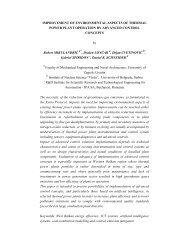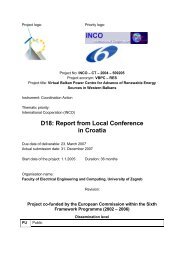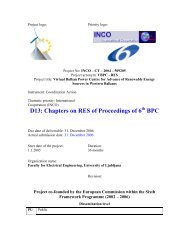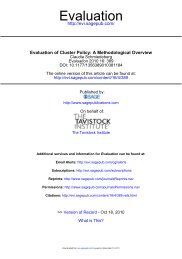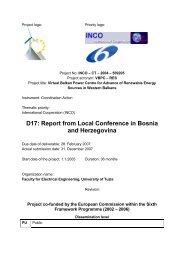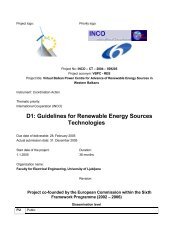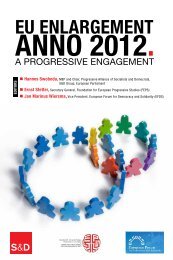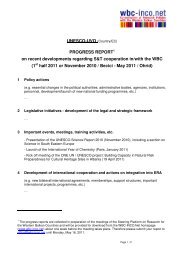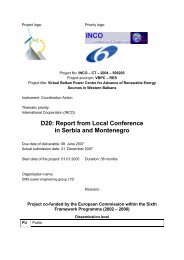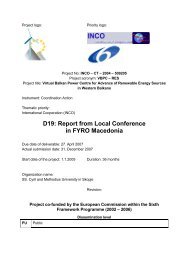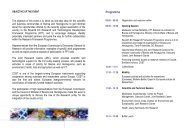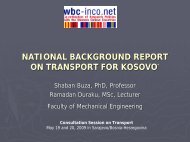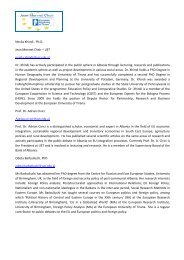S&T Country Report - Albania - WBC-INCO Net
S&T Country Report - Albania - WBC-INCO Net
S&T Country Report - Albania - WBC-INCO Net
Create successful ePaper yourself
Turn your PDF publications into a flip-book with our unique Google optimized e-Paper software.
y leading international development institutions, such as the World Bank and the<br />
European Bank for Reconstruction and Development, while the processes of the<br />
European Union and the World Trade Organization accession are under way.<br />
In 2005, Serbia received wide international recognition for economic and legislative<br />
reforms and improvement of business climate. The last year’s (2006) highlights<br />
related to the country’s overall progress were the following (SIEPA, 2006):<br />
• A positive Feasibility <strong>Report</strong> by the EU and the start of negotiations on the<br />
Stabilization and Association Agreement (SAA);<br />
• Successful completion of a 3-year financial agreement with the IMF;<br />
• The World Bank’s guide Doing Business in 2006 naming Serbia the top global<br />
reformer;<br />
• Highly graded structural reform progress in Central and Eastern Europe by the<br />
European Bank for Reconstruction and Development (EBDR);<br />
• Upgrading of Serbia’s credit rating by Standard & Poor’s and Fitch;<br />
• Serbia proclaimed as a winner by the OECD Investor of the Year award for the<br />
biggest foreign Greenfield investment in South East Europe in 2004 and 2005.<br />
Serbia has adopted a medium-term approach to SME development. It has<br />
established a solid policy framework and implemented reforms in the company<br />
registration and tax policy areas. Serbia systematically applies Regulatory Impact<br />
Analysis (RIA) to new legislation and regulations. It is developing a pro-active profile<br />
on innovation policy. With respect to the remaining dimensions, it is working steadily<br />
on the policy-building blocks.<br />
The Government of Serbia has a policy targeted at removing barriers to foreign<br />
investment. It effectively improves the overall business climate and benefits small<br />
businesses, but no particular policy attention is given to the needs of small<br />
businesses (OECD and EC, 2007).<br />
The Law on Innovation Activity (Official Gazette of the Republic of Serbia, no.<br />
110\05), which was adopted in December 2005, defines the business-technology<br />
incubators as a commercial company whose main activity is to provide and rent<br />
available office space, administrative, technical and other services to newly started<br />
commercial companies or innovation organisations. In Article 21, incubators are<br />
defined as organisations providing infrastructure support to the innovation activity.<br />
Concerning innovation and technology (I&T) centres and co-operation - Serbia has<br />
established a policy framework and has active programmes to foster technological<br />
co-operation.<br />
On the other hand, UNMIK/Kosovo has not yet developed significant initiatives to<br />
encourage technology transfer. In UNMIK/Kosovo the SME strategy is being drafted<br />
as part of a National Development Plan. The national development planning process<br />
is in the phase of identifying projects and budget resources. The strategy has not yet<br />
been approved. A short-term strategy compiled and approved by the Ministry of<br />
Economy in September 2005 has not yet reached the implementation stage due to<br />
budget limitations (OECD and EC, 2007).<br />
page 6/SRB



